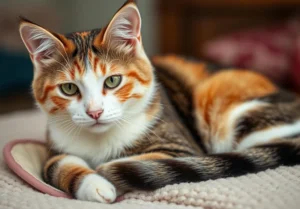Has your furry feline friend been showing signs of cracked paws recently? If so, you may be wondering what could be causing this discomfort. Let’s explore the possible reasons behind why your cat’s paws might be cracked, and what you can do to help alleviate this issue.
Environmental Factors
Cracked paws in cats can be attributed to various environmental factors such as cold weather and exposure to harsh chemicals. Just like our skin can become dry and cracked in harsh conditions, the same can happen to your feline friend’s delicate paw pads. Cold weather can strip the moisture from their paws, leaving them vulnerable to cracks. Similarly, walking on surfaces treated with harsh chemicals can cause irritation and cracking.
Lack of Moisture
A lack of moisture in the air or poor hydration can also contribute to cracked paws in cats. Dry air can sap the moisture from your cat’s paw pads, leading to dryness and potential cracking. Make sure your cat has access to clean, fresh water at all times to ensure proper hydration. Consider using a humidifier in your home to increase the moisture in the air and help prevent dry, cracked paws.
Additional Unique Insight: Regularly check your cat’s paw pads for any signs of cracks or irritation. Catching the issue early can prevent it from worsening and causing discomfort for your furry friend.
Nutritional Deficiencies
Is your furry friend dealing with cracked paws? Well, it might be due to some nutritional deficiencies in their diet. Essential vitamins and minerals like Vitamin E, biotin, and omega-3 fatty acids play a crucial role in maintaining healthy skin and paw pads for your cat. A lack of these nutrients can lead to dry, cracked paws. To tackle this issue, make sure your cat is getting a balanced diet that includes all the necessary nutrients. Consider incorporating supplements, like fish oil or a multivitamin specifically formulated for cats, to boost their nutrition and keep those paws smooth and soft.
Allergies
If your cat’s paws are looking a bit worse for wear, allergies might be the culprit. Allergies to various substances such as certain cleaning products, litter, or even pollen can cause irritation and cracking of the paw pads. To help your feline friend out, try switching to unscented, hypoallergenic cleaning products and litter. Keep an eye out for any signs of irritation on your cat’s paws, like itching or redness, and consult with your vet if needed. By identifying and avoiding the allergens, you can help your cat’s paws heal and prevent future issues.
Extra Tip: Consider using natural or organic cleaning products to reduce the risk of triggering allergies in your cat.
Overgrooming
Does your feline friend seem to be grooming their paws more than usual? Well, overgrooming could be the culprit behind those cracked paws. Excessive licking and grooming can lead to irritation and dryness, causing the paw pads to crack. To help remedy this, consider addressing any potential stressors in your cat’s environment that may be causing them to overgroom. Providing stimulating toys, regular playtime, and a calm environment can help reduce this behavior and give those paws a chance to heal.
Medical Conditions
Cracked paws in cats can also be a sign of underlying medical conditions. Keep an eye out for potential fungal infections or autoimmune disorders that could be causing your cat’s paws to crack. If you notice any other symptoms such as redness, swelling, or changes in behavior, it’s essential to consult with your veterinarian for a proper diagnosis and treatment plan. By addressing the root cause of the issue, you can help your furry friend get the relief they need and prevent further discomfort down the road.
Home Remedies
If you’re puzzled about why your cat’s paws are cracked, fret not; there are some paw-some remedies you can try at home! First off, make sure your feline friend’s environment isn’t too dry or causing irritation. Moisturize those cracked pads with a cat-friendly balm to soothe and heal them. You can also consider investing in some protective booties to give those paws a break from harsh surfaces. Remember, a little TLC goes a long way in keeping those paws in tip-top shape!
Additional Tip:
- Regular grooming: Keep your cat’s paws clean and trimmed to prevent any further irritation or cracking. This simple step can make a big difference in paw health.
Veterinary Care
If your kitty’s cracked paws are causing them discomfort, it might be time to seek help from a professional – a vet, that is. Expert care can identify any underlying issues causing the cracks and provide targeted treatment to heal those paws effectively. Remember, your cat’s well-being is a top priority, so don’t hesitate to reach out for professional help when needed.
Recommended Action:
- Consultation with a vet: Schedule a visit with a vet to get a proper diagnosis and treatment plan tailored to your cat’s paw condition. Your furry friend will thank you for it!
Fun Fact: Cat Paws
Did you know that cat paw pads are not just cute, but also super unique? Each cat’s paw pads have a special ridged texture that acts like a fingerprint, making them distinctive to each individual cat. These pads help cats grip onto surfaces and navigate their environment with precision.
Why Are My Cat’s Paws Cracked?
Dry or cracked paw pads in cats can be caused by a variety of factors. One common reason is dehydration, so make sure your cat has access to plenty of fresh water. Harsh weather conditions, exposure to chemicals, or rough surfaces can also lead to cracks in your cat’s paws. To help prevent and treat cracked paws, consider using a pet-safe paw balm to moisturize and protect their pads. Additionally, providing a comfortable resting area with soft bedding can help prevent further irritation.
Tips to Protect Your Cat’s Paws:
- Stay Hydrated: Ensure your cat drinks enough water to prevent dehydration.
- Use Pet-Safe Products: Choose paw balms specifically designed for cats to moisturize their paw pads.
- Avoid Harsh Surfaces: Keep your cat away from rough or chemical-laden surfaces that can cause irritation.
- Comfortable Resting Area: Provide soft bedding for your cat to relax and protect their paws from further damage.
Alex, a passionate animal lover, has experience in training and understanding animal behavior. As a proud pet parent to two dogs and three cats, he founded AnimalReport.net to share insights from animal experts and expand his knowledge of the animal kingdom.




